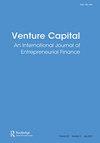国外和国内风险投资公司在更换被投资公司ceo方面有什么不同吗?
IF 2.8
4区 管理学
Q2 BUSINESS, FINANCE
引用次数: 0
摘要
摘要本文以1997年至2017年间风险投资公司对中国企业的5383起投资事件为样本,研究了被投企业ceo人力资本水平对国内外风险投资公司撤换ceo倾向的影响。我们发现,如果ceo的人力资本水平较高,国内和国外的风投公司都不太可能替换其投资组合公司的ceo。此外,我们还发现,在不考虑CEO人力资本或CEO人力资本水平较低的情况下,国内外风投公司在CEO更替方面存在显著差异。研究结果与我们的假设一致,即外国风投比国内风投更依赖CEO人力资本作为一个更强的质量信号,因为他们更难以监控CEO的投资后绩效。相反,国内风投在地理和文化上的接近性使其能够获得CEO人力资本以外的信息,如CEO的社交技能、潜力、创业热情、魅力等,从而做出替代决策。本研究增进了我们对国内外风投在投后管理过程中行为差异的理解。关键词:外资企业ceo国内企业ceo更替人力资本投资组合公司披露声明作者未报告潜在利益冲突。PitchBook新闻与分析,2022年3月18日。可在https://pitchbook.com/.2获得。中国的高等教育分为四个层次:专科、学士、硕士和博士。毕业后可获得学士、硕士和博士学位。专科教育一般招收高中以上学历或同等学历的学生,专科学生毕业后可取得专科证书。VC与被投资公司之间的地理距离以及VC对之间的地理距离数据来自全球时间和时区管理网站https://www.timeanddate.com/。平均受教育年限的数据来自中国国家统计局,可在http://www.stats.gov.cn/tjsj/ndsj/.5上查阅。达尔豪斯大学大气成分分析小组提供北美、中国、欧洲和其他地区的PM2.5数据来源。数据可从https://sites.wustl.edu/acag/datasets/surface-pm2 -5 /.6获得。vc的隶属关系数据来自Chen等人(Citation2021)。本研究得到国家自然科学基金资助[71962033]。本文章由计算机程序翻译,如有差异,请以英文原文为准。
Do foreign and domestic venture capital firms differ in replacing CEOs of portfolio companies?
ABSTRACTUsing a sample of 5,383 investment events of venture capital firms (VCs) investing in Chinese companies between 1997 and 2017, we investigate how levels of human capital of chief executive officers (CEOs) of portfolio companies affect tendencies of foreign and domestic VCs to replace CEOs. We find that domestic and foreign VCs are similar in that they are both less likely to replace CEOs of their portfolio companies if CEOs have higher levels of human capital. Furthermore, we find that domestic and foreign VCs exhibit significant differences in CEO replacement when not considering CEO human capital or when CEOs have lower levels of human capital. Results are consistent with our hypotheses that foreign VCs rely on CEO human capital as a stronger quality signal than domestic VCs, because they have more difficulty monitoring CEOs’ post-investment performance. On the contrary, the geographical and cultural proximity of domestic VCs enables them to obtain information other than CEO human capital, such as CEOs’ social skills, potential, entrepreneurial passion, and charisma, to make replacement decisions. The study advances our understanding of the behavioral differences between domestic and foreign VCs in the post-investment management process.KEYWORDS: Foreign VCsdomestic VCsCEO replacementCEO human capitalportfolio company Disclosure statementNo potential conflict of interest was reported by the author(s).Notes1. PitchBook News & Analysis, Mar 18, 2022. Available at https://pitchbook.com/.2. Higher education in China is divided into four levels: specialist, bachelor’s, master’s, and doctoral levels. Bachelor’s, master’s, and doctoral degrees could be obtained upon graduation. Specialized education generally enrolls students who have graduated from high school or have equivalent education, and specialized students can obtain a specialized certificate after graduation.3. Data on the geographic distance between VCs and portfolio companies and between VC pairs were obtained from https://www.timeanddate.com/, a global time and time zone management website.4. Data on average years of schooling are from the National Bureau of Statistics of China and are available at http://www.stats.gov.cn/tjsj/ndsj/.5. The Dalhousie University Atmospheric Composition Analysis Group provides PM2.5 data sources for North America, China, Europe, and other regions. The data is available at https://sites.wustl.edu/acag/datasets/surface-pm2–5/.6. Data on VCs’ affiliation is obtained from Chen et al. (Citation2021).Additional informationFundingThis work was supported by the National Natural Science Foundation of China [71962033].
求助全文
通过发布文献求助,成功后即可免费获取论文全文。
去求助
来源期刊

Venture Capital
BUSINESS, FINANCE-
CiteScore
4.10
自引率
16.70%
发文量
21
期刊介绍:
Venture Capital publishes cutting edge research-based papers from academics and practitioners on all aspects of private equity finance such as: •institutional venture capital •informal venture capital •corporate venture capital •public sector venture capital •community venture capital It also covers all aspects of the venture capital process from investment decision to exit, including studies on: •investment patterns •investment decision-making •investment performance •realisation of investment value exit routes (including the relationship with junior capital markets such as NASDAQ, EASDAQ, AIM and Nouvelle March). •economic impact and public policy
 求助内容:
求助内容: 应助结果提醒方式:
应助结果提醒方式:


